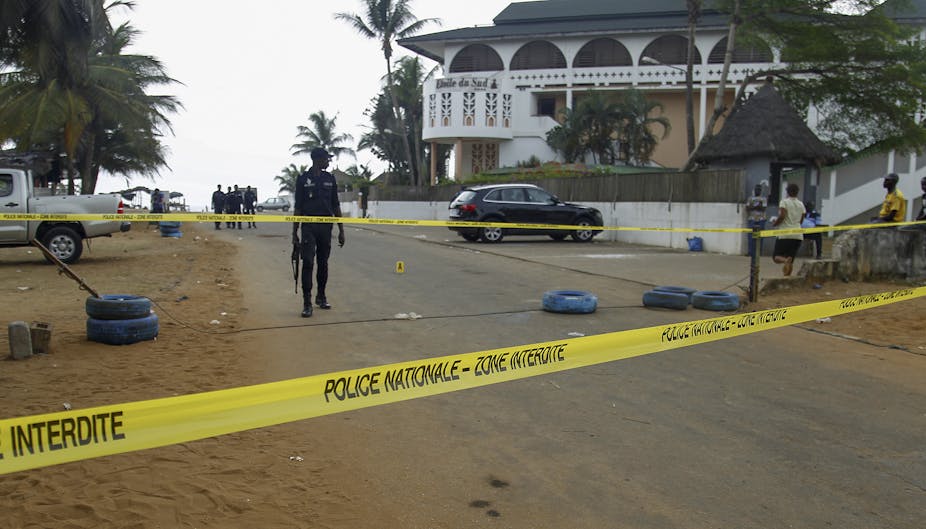For the fourth time in five months, a major terror attack inspired by radical Islamist ideology has been perpetrated in the Francophone world. After the November 13 attacks in Paris, gunmen targeted a hotel in the Malian capital Bamako, followed by another hotel in Ouagadougou in Burkina Faso.
Then on March 13, gunmen opened fire at several hotels in the seaside resort of Grand Bassam, Côte d'Ivoire, killing 18 people and injuring 33. Like the attacks in Mali and Burkina Faso, al-Qaeda in the Islamic Maghreb has reportedly claimed responsibility.
Ivorians knew they were near the top of the hit list for Islamist militant groups operating in West Africa. After a bloody and highly divisive civil war in the early 2000s, the country has been slowly recovering under the leadership of its president Alassane Ouattara, who was democratically elected head of state in 2011. With French military support, Ouattara had to expel his predecessor Laurent Gbagbo, who had a different view of the outcome of the election. Gbagbo is now on trial at the International Criminal Court in The Hague.
Patrols in Côte d'Ivoire’s capital, Abidjan, were scaled up quite visibly in the last few months. Curiously, the very popular seaside resort of Grand Bassam, which had briefly been the colony’s capital in the late 19th century, was apparently not included in these anti-terror measures.
Naturally, it was the weaker spot which the attackers chose to strike. In doing so, they fulfilled several goals. It sent the message that France and her allies remain a prey of choice in the region. The attackers re-asserted the place of al-Qaeda as firmly on the map of international jihadism, at a time when it could be eclipsed by the so-called Islamic State. And, tactically, it extended the range of Islamist terrorism to a country which has been hitherto spared its travails.
French interests under attack
While the US is regularly described as the main target of radical Islamist militants, in recent years references to France have reached almost the same level of hatred in their official statements.
Within two days of the attacks in Grand Bassam, French ministers Bernard Cazeneuve and Jean-Marc Ayrault had travelled to Abidjan to meet Ouattara. They announced that a special force of gendarmes would be stationed in Burkina Faso to react to future terrorist threats in the region.

As a major source of Western cultural influence in North and West Africa, France stands in the way of the islamisation and Arabisation of society advocated by Islamist extremists.
France has been muscularly confronting militarily Islamist terrorism since its intervention in Mali in 2013. Operation Serval in Mali was replaced in 2014 with a larger initiative, Operation Barkhane, involved in anti-terrorist intelligence and military operations across the whole of the Sahel region.
France is a major military, political and cultural obstacle that stands in the way of Islamist terrorists in West Africa. Alongside northern Nigeria, targeted by militant Islamist group Boko Haram, Francophone Africa has become a major hot spot on the map of terror inspired by an interpretation of Islam which is completely alien to local spiritual traditions.
IS vs al-Qaeda
Competition for supremacy among Islamist groups is also a major factor in explaining this wave of terrorist acts in West Africa. In the wake of several conflicts which started in Algeria in the 1990s and have remained active on several fronts since then – Mali, Libya and Nigeria, to name just a few – many groups claiming to defend the cause of an Islamic caliphate in North and West Africa have been vying for influence in the region.
Al-Qaeda has traditionally dominated the region’s terrorist groups thanks to the late but steady affiliation of a strong contingent of Algerians hardened by a decade of combat in the civil war of the 1990s. But it is feeling the impact of being globally overshadowed by the so-called Islamic State.
While both share the ultimate goal of their struggle (the establishment of a rigorous caliphate inspired by the example of the early years of Islam), they compete to impose their own specific views and their supremacy, often in addition to personal rivalries.
With the rise of Islamic State, al-Qaeda needs to orchestrate high impact actions if it wants to retain its financial channels and to keep recruiting militants – two key assets in global jihad.
The Bamako, Ouagadougou and Grand Bassam attacks have to be understood against the backdrop of this major internal struggle between radical Islamist groups.
With the exception of Somalia, most Sub-Saharan African states have so far resisted full-scale attempts by Islamist militants to destabilise them. Often they have had French or American military and logistical help.
In the ongoing battle against Boko Haram, the group’s military strength seems to be currently receding in Nigeria. The military situation in Sub-Saharan Africa also appears less volatile than it was three years ago, when the violence in Mali was at its worst. It is in al-Qaeda’s interest to demonstrate spectacularly that the potential for contagion remains significant.
Unfortunately, it is possible that the Grand Bassam attack will be just another chapter in a longer story that will keep unfolding in West Africa and beyond. This could bring with it even more such bloody episodes, true to the deadly logic of the ideology of their perpetrators.

